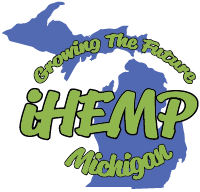,Agricultural Improvement Act of 2018
With the passing of the 2018 US Farm Bill, industrial hemp is now a new major crop to farm. Below is the Michigan adoption of industrial hemp, House Bill 6330.
Hemp – Resource or Scourge?
Quick Overview of Industrial Hemp in America
Hemp was an important crop in the early days of the U.S. It was necessary for the production of rope, canvas and paper. With a history dating back to 8,000 BC, hemp has been an important crop for the worlds need for fiber and food.
The invention of the cotton gin overshadowed hemp as a textile source due to the extremely labor-intensive nature of hemp processing. Cotton became the crop of choice for the textile industry with the introduction of the cotton gin in 1793. The next blow to industrial hemp came with DuPont patenting their new “plastic fiber” in 1930. Despite newly affordable machinery which separated the fiber from the rest of the plant, propaganda campaigns by companies invested in the new petroleum-based synthetic textile and lumber barons put pressure on the industry. A 1938 article in Popular Science predicted that industrial hemp would be a billion dollar industry. However, in September of 1937, the government banned the production of hemp with the Marijuana Tax Act. Some feel that powerful groups felt threatened, and they coerced the government into imposing the ban. Canada followed with their own ban in August of 1938.
Hemp came back during World War II. The Japanese invasion of the Philippines cut off imports of hemp, which was still essential, and the government lifted restrictions until the end of the war. Over 150,000 acres of hemp were cultivated as a result of the USDA’s Hemp For Victory campaign. Hemp was again illegal to grow after the war, so it was imported again.
In 1969 the Marijuana Tax Act was ruled unconstitutional in Leary vs the United States. So Congress came up with the Controlled Substances Act and made Cannabis a Schedule 1 controlled substance, equal to heroin.
Fast forward to 2018 and the Agricultural Improvement Act of 2018 (H.R. 2) was introduced by Rep. Conaway that will bring industrial hemp back as a productive and profitable crop.
Michigan Department of Agriculture and Rural Development moved quickly to create a Research Pilot Program for Industrial Hemp. In 2019 hemp was grown in 58 counties in Michigan by over 600 growers with over 200 processor/handler licenses. The numbers reported by 514 licensees totaled 3,678 acres planted outdoors and 400,977 square feet of indoor grown.
iHemp Michigan hosted educational workshops throughout Michigan in 2019 and helped 52 members get their growers license on Earth Day of 2019.
Results were mixed through the season with crops going hot, being stolen or growers not having a plan to harvest and cure. The value of a liter of CBD distillate was $4,000 at harvest time.
The oversupply from 2019 grows put a lot of pressure on pricing for CBD and many pivoted to growing CBG genetics. The licensed numbers grew in 2020 but more were getting into trouble by following the advice of the wrong people.
The program changed in 2021 when the growing fee went from $100 to $1,250, eliminating test and trial fields for research that were being done independently. Processor/Handler licensing licensing fees changed from $1,250 to $1,350. New testing rules were introduced by the USDA which required MDARD to train and hire additional staff to collect samples.
In 2022, Governor Gretchen Whitmer signed an executive order moving the regulation of all cannabinoid production to the Michigan Marihuana Regulatory Agency to be renamed the Cannabis Regulatory Agency. Less than 100 growers purchased licenses in 2022. Demand is growing as buyers are looking for stable supplies of biomass to fill a slowly growing CBD retail market.
Industrial Hemp still has the same challenges with banking and other services as marijuanna. Investment dollars are going into the recreational marijuanna market as it is rapidly growing. The market value of recreational marijuanna are plummeting and major consolidation is happening. Investment dollars for the build out of the processing facilities needed for industrial hemp are slow to enter the market. The Safe Banking Act and other reforms are being worked on to remove uncertainty and risk that is keeping serious investment from industrial hemp.
Fiber and grain are expected to be major commodities for future farmers. Michigan produced hemp seed oil, and small batches of hemp hurd are available from Down On The Farm. Hemp is being used to build homes around the world, including homes here in Michigan.
Historical Pro Hemp Gov Propaganda
The video below was broadcast by U. S. Government to promote the growing of hemp for the war effort in the 1940’s.
Henry Ford Creates Bio Fuel & Hemp Panels
The video below shows what hemp can produce in car panels and biofuel!
Door Panels To The Test!
Reproducing the results and testing with a sledge hammer! Check the video out below.
Farm Bill 2018
Discussion of the Farm Bill.
